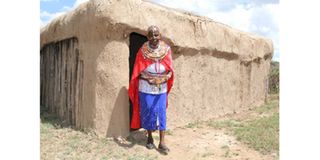Laikipia women’s group trained to boost cultural tourism venture

One of the Manyattas at Twala Tenebo Cultural Centre at Il Polei trading centre in Laikipia North.
What you need to know:
- Over the years, retrogressive cultural practices such as female genital mutilation (FGM) and early child marriage have hindered their participation in economic activities.
- Tourism Professional Association representative Sam Ikwaya said they are keen on supporting and promoting tourism players at the local level so as to diversify tourism products.
At least 100 women who have ventured into cultural tourism in Laikipia North have acquired training in how to flourish in the sector by tapping into domestic and international markets.
Over the years, retrogressive cultural practices such as female genital mutilation (FGM) and early marriages have hindered their participation in economic activities. This is changing.
Members of Twala Tenebo Cultural Centre at Il Polei trading centre are part of those who benefitted from three-day training organised at Sportsmans Arms Hotel, Nanyuki, by Tourism Fund, Tourism Professional Association (TPA) and the Laikipia government.
Two hundred and three members of the cultural centre opted to unchain themselves from the traditional practices by venturing into cultural tourism that has immensely improved the local economy.
Skills
Ms Pamela Morijo, a member, said the training has sharpened their beadwork skills and how to attract more tourists.
“We have been trained in how to market our bead products and revive our businesses at the grassroots. We will have a better market and advance economically,” Ms Morijo said yesterday.
“We have been trained in how to offer first aid treatment to our patients in case they encounter an accident or get ill in our business premises. We have been enlightened on how to come up with better products for my customers.”
The centre has solar-powered accommodation facilities for visitors and a modern conference facility that can host over 300 guests. They entertain tourists, teach them about Maasai culture, make and sell ornamental beads and other traditional artefacts.
Diversification
Tourism Professional Association representative Sam Ikwaya said they are keen on supporting and promoting tourism players at the local level so as to diversify tourism products countrywide.
“Tourism is not about the Coast and Maasai Mara. As a professional organization, we will work with all counties to strengthen them because tourism is a devolved function. Our partnership and involvement in training women who have ventured into cultural tourism is important because they are critical players,” Mr Ikwaya said.
He said that the knowledge that was passed to the women’s groups would help them grow their market and render high-quality services to their guests.
“The needs and gaps that have been identified from this training will be followed up by the county government’s Tourism department so that we get competitive products and ensure that the culture of the Maasai community is recognised and put on the world map,” the trainer said.
Mr Eden Odhiambo, Tourism Fund director of resource mobilisation and strategy, urged the women to unite and take advantage of the readily available market through assistance of the devolved unit.
Call for unity
“We have sensitised them to the need to remain united in this sector. When you train a group of people, they get excited. Our mandate, henceforth, is to follow up on what they will do with the skills they have acquired. We will come back and fill any gap that might be there,” he said.
County Executive for Tourism and Co-operative Development Biwot Tirop said the capacity building programme will enable the women to maximise their output and get more customers.
“We have trained them in beadwork, quality standards, and profit and loss. They have exchanged contacts with their trainers so that they can always consult on how to grow cultural tourism. This county contributes immensely in the tourism sector and we are happy that the government is supporting our key players in the sector,” Mr Biwot said.
In September, the stakeholders will convene another session with the women groups to monitor their progress.
Twala women’s group chairperson Cecilia Ekere said they subdivide their dividends among members twice a year to enable them to sustain their families.
“Our women have stopped over-reliance on their husbands for a financial boost. This humble initiative has enabled us to comfortably pay school fees for our children and buy livestock for the family. This was not the case before we started this group, as the majority of Maasai women are not economically empowered,” Ms Ekere said.





